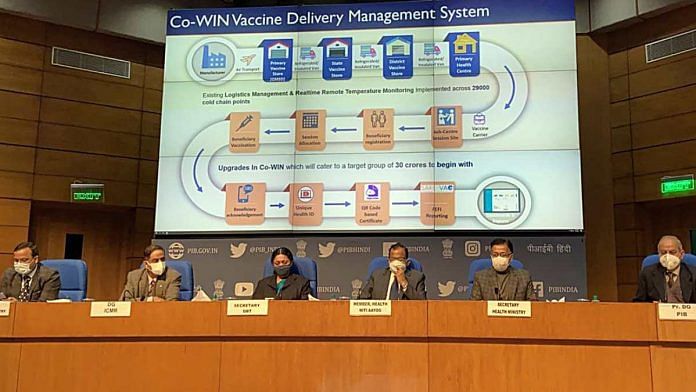
New Delhi: India is looking to rollout its Covid-19 vaccination programme by 13 January, with Union Health Secretary Rajesh Bhushan saying that vaccine rollout will “happen within 10 days of the date when accelerated approval was granted for the two vaccines”.
The two vaccines — Bharat Biotech’s Covaxin and Serum Institute of India’s (SII) Covishield — were approved on 3 January.
At a press briefing Tuesday, Bhushan also said that for the first two priority groups of vaccine recipients — healthcare and frontline workers — there will only be bulk registration through district administrations, hospitals etc., while for the other two groups — people aged more than 50 years or younger with comorbidities — the option of self-registration will be used.
Teachers should be vaccinates first
There is, however, at the moment no plan to vaccinate children.
Replying to a question from ThePrint on whether there is a plan to vaccinate children and to allow schools to reopen, ICMR Director-General Dr Balram Bhargava said: “This is very important. UK burnt its fingers twice (in trying to open schools). Teachers should be the first to be vaccinated and also adults need to be vaccinated so that the spread is not there.
“Some 12-18-year-old children were vaccinated in the Bharat Biotech trial,” he added.
The vaccination programme will be carried out through the digital platform CoWIN, which Bhushan described as one-of-its-kind.
Not only does it have the option of beneficiary verification using multiple identification documents, it also has the option of generating Digital Health ID for those who want it, and is capable of sending text messages in 12 Indian languages.
The Government of India, he added, will also assist any country that wants to use it for their vaccination programme.
Mutations won’t affect current vaccine plans
Giving a low-down on the various vaccines that are being developed in the country, Secretary, Department of Biotechnology, Renu Swarup said, “The mutations in the spike protein of the SARS-CoV-2 don’t substantially affect the antibody accessibility as assessed by computer modelling.
“In order to study it better we are also synthesising the spike gene with the mutations and investigating the changes to find out implications of any alteration in the exposure of the antigenic epitopes that are being used in the leading vaccine candidates,” she added.
Dr Bhargava asserted that the clearance to Covaxin is according to the New Drugs and Clinical Trial Rules, 2019 that allow the drug controller to grant marketing approval based on phase 2 clinical trial data.
He said the approval in “clinical trial mode” means that informed consent will be taken from beneficiaries, they will be followed up and there will be no placebo shots given.
Dr V.K. Paul, member (health), NITI Aayog said, “What is exciting about Covaxin is that it is generating antibodies not just against spike protein but also against two other proteins. The SEC (subject expert committee) noticed this.
“Scientific rigour has been followed… These decisions are being made in a context that these are not regular authorisations. No vaccine anywhere has got regular authorisation.”
Bhushan, meanwhile, declined to react to AIIMS director Dr Randeep Guleria’s comment that Covaxin, which is still in phase 3 trials and does not have efficacy data, was approved as a “back-up”.
Bhushan also denied that the government has put any restrictions on export of vaccines by the pharmaceutical companies. He cited the joint statement of Bharat Biotech and SII pledging global access to their products.
Subscribe to our channels on YouTube & Telegram
Why news media is in crisis & How you can fix it
India needs free, fair, non-hyphenated and questioning journalism even more as it faces multiple crises.
But the news media is in a crisis of its own. There have been brutal layoffs and pay-cuts. The best of journalism is shrinking, yielding to crude prime-time spectacle.
ThePrint has the finest young reporters, columnists and editors working for it. Sustaining journalism of this quality needs smart and thinking people like you to pay for it. Whether you live in India or overseas, you can do it here.